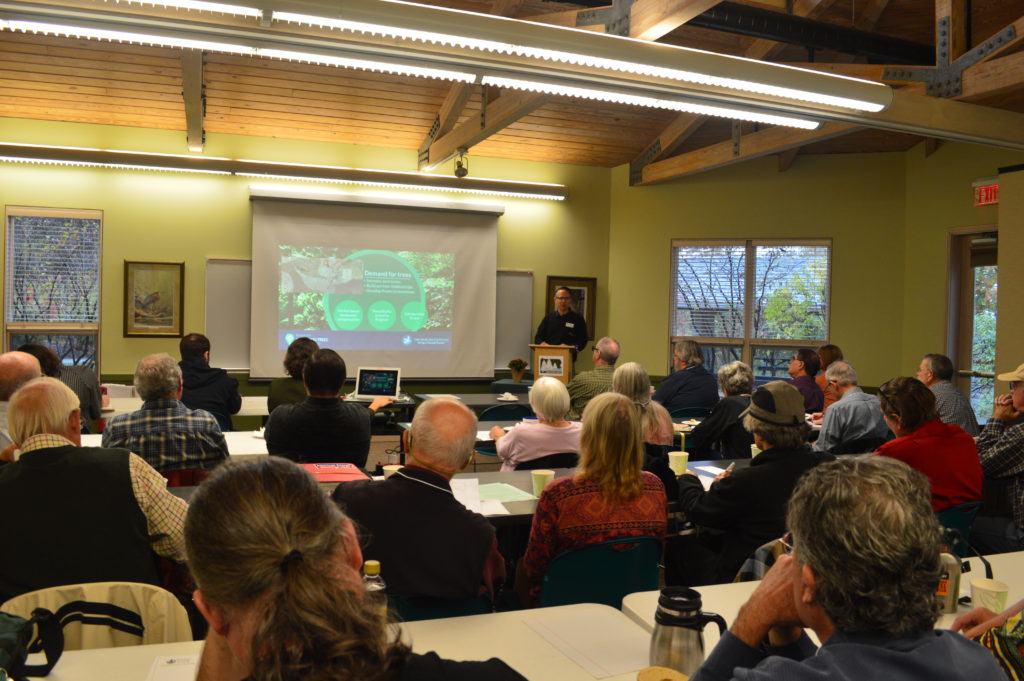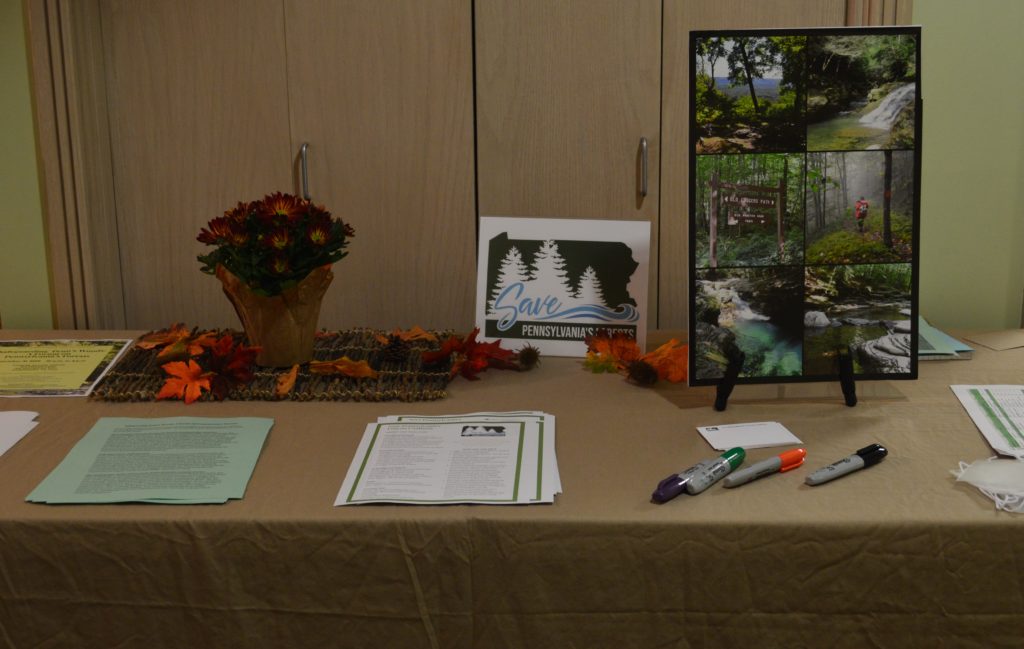On October 31, 2019, SPF held our much-anticipated event “Safeguarding Penn’s Woods: A Forum on Pennsylvania’s Forests” at the Olewine Nature Center located at Wildwood Park in Harrisburg.
The day began with a presentation given by Harry Campbell, Pennsylvania Executive Director, Chesapeake Bay Foundation, who discussed the importance of native trees in combating climate change and rebuilding the biodiversity and water quality of our Commonwealth. Much of our large group discussion centered around how to convince farmers and landowners that investing in the growth of native trees is not only good for the environment, but for their own economic benefit as well. We also debated on how to convince legislators that the planting of trees is key to Pennsylvania’s environmental health. While science and data should be enough to convince policymakers of the importance of trees, it is often personal narrative and the power of large groups of constituents that leads to statewide change.
Are there farmers or other large-scale landowners in your area who have committed to planting more trees on their property? If not, how would you convince them of the benefits of tree planting?
What types of narratives surrounding trees are our legislators not being exposed to?

The next presentation was given by Ellen Shultzabarger, Director of the Bureau of Forestry and State Forester, and Cindy Adams Dunn, Secretary, Pennsylvania Department of Conservation and Natural Resources (DCNR). Ms. Shultzabarger and Secretary Dunn discussed the current state of Pennsylvania’s forests and the many projects that DCNR is implementing to conserve our forestland for the future. Some of these projects included the conservation of native plants, preventing and suppressing wildfires, and protecting vernal pools.
My personal favorite point from this presentation was Secretary Dunn’s mention that communities living in urban areas have a more difficult time cooling their homes in the summer due to a lack of tree shade. This can become particularly life-threatening if families are having difficulty affording their electric bills to run their air conditioners, and the issue will only continue to grow worse as climate change heats cities more and more. This is not a topic that we often think of when it comes to climate change and the importance of trees and forests, but it is one of many examples of how environmental issues and poverty intersect.
How do you think our state’s recent entry into the Regional Greenhouse Gas Initiative (RGGI) will shift our government’s programmatic focuses?
The next speaker was Greg Czarnecki, director of Applied Climate Science at DCNR. His presentation focused on the effect of climate change on our Commonwealth’s forests. The talk began with a brief explanation of the science of climate change, followed by the unique ways in which it is negatively impacting Pennsylvania. For example, Pennsylvania sees the most cases of Lyme disease in the country and these numbers will only continue to rise as winters see more frequent warm spells, allowing ticks to thrive and live through winter months in which they used to succumb. Attendees asked about how to better combat climate change myths and discussed what it would look like for every organization to have a climate change mitigation plan.
Where are you seeing the impacts of climate change in your community?

Next, Brook Lenker, Executive Director of FracTracker Alliance, talked about his work in mapping the impacts of natural gas extraction. The audience was able to hear about his organization’s work in tracking the impacts of natural gas infrastructure in the Pine Creek watershed, and Mr. Lenker gave thorough explanations about what the maps were showing. It was shocking and heart-breaking to see the number of natural gas wells that have been drilled in such a small area of forest. Attendees questioned the slow pace of DEP inspections taking place at many of these wells (and, thus, lower numbers of violations being recorded than there actually are).
Interested in helping FracTracker follow the development of drilling activity across the state? Check out the FracTracker mobile app, available on the App Store and Google Play. If you see oil and gas infrastructure in your neighborhood, take a picture and upload it. You can also track reports from other users across the state.
Our last presenter was Attorney John Childe, Chief Counsel for Pennsylvania Environmental Defense Foundation (PEDF). Mr. Childe gave an overview of his case against DCNR, fighting for the state to uphold Article 1 Section 27 of our state’s constitution.
For those who don’t know, Article 1 Section 27 states:
“The people have a right to clean air, pure water, and to the preservation of the natural, scenic, historic and esthetic values of the environment. Pennsylvania’s public natural resources are the common property of all the people, including generations yet to come. As trustee of these resources, the Commonwealth shall conserve and maintain them for the benefit of all the people.”
PEDF is fighting to hold our state accountable to our constitutional right to a healthy environment, and for the conservation of Pennsylvania’s public forest and park lands. Mr. Childe shared that the Pennsylvania Supreme Court ruled that money made from the sale of our natural resources, including natural gas, on the Commonwealth’s public forestland and parks cannot be used to finance our state budget. Audience members asked how this case could be taking so long despite the court’s ruling, as well as how we as PA residents can help support this important fight.
What do you think our state’s economy and policies would look like if Article 1 Section 27 was taken seriously? Interested in giving to help support this litigation? Visit https://www.pedf.org/donate-for-litigation.html
Since the event, PEDF has filed a lawsuit in Commonwealth Court asking the Court to require DCNR to manage our state’s forests as stated in Article 1 Section 27 and to defend them from the serious harm of drilling impacts.
– Submitted by Madi Keaton, SPF Coordinator
